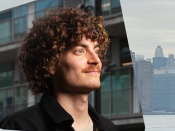Mónica C. Silva
Post-Doc Researcher (EG Group)
Olfactory receptors (ORs) are membrane proteins largely responsible for odour perception, facilitating the detection of tens of thousands unique odorants in the environment. They are encoded by the largest vertebrate gene family. Although there are still many unanswered questions regarding how the olfactory system works and evolves, it allows the recognition of suitable food, mates, habitats, predators and prey, playing a critical role in species’ survival and reproduction.
In this talk I will start by providing a brief overview of the structure and evolutionary patterns that characterize OR genes in vertebrates. I will then extend the understanding of the evolution of the OR genes to the avian group, by focusing on Procellariiform seabirds, also known as tubenoses. This avian group has anatomical features correlated with high olfactory capability, and have been shown to rely on the sense of olfaction for critical ecological functions. We built a cosmid library of Cory’s Shearwater (Calonectris diomedea) gDNA, and sequenced OR gene positive cosmid clones with a combination of Sanger (cosmid ends), Illumina and 454 sequencing technologies. The resulting hybrid assembly has a cumulative length of 7.4Mb, including 399 unique scaffolds (2.6Mb), and ~ 21K degenerate scaffolds. We identified a total of 221 ORFs (> 75 amino acids), some of which are full length OR genes. The numbers of putatively functional, partial and pseudogenes found in the dataset suggest that genes in this bird clade might be also evolving according to a birth-and-death model of evolution. Phylogenetic analyses of shearwater, chicken, zebra finch and lizard OR genes revealed at least three distinct clades in Cory’s Shearwater. Some genes cluster with those of the other species, in a less diverse, tetrapod-specific, alpha clade. A few genes cluster with those of the other species in a gamma clade that also predates the divergence of birds. However, most of the sampled shearwater genes belong to the avian-specific gamma-c clade, within which sequences cluster by species, consistent with a scenario of ubiquitous events of duplications, deletions and/or gene conversion. Using likelihood-based approaches, we identified signals of positive selection on full gamma-c clade genes, suggestive that positive selection is playing a role in the functional diversification and ecological adaptation in a bird lineage that has been shown, ecologically, to rely extensively on olfaction.

















